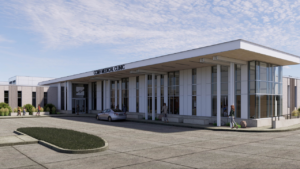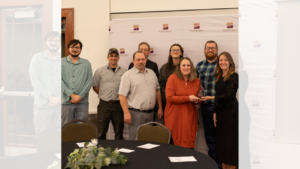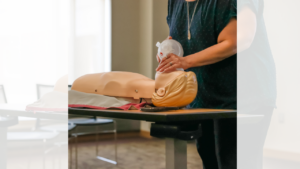“Veterans face different challenges because we’re all unique individuals and veterans are too.”
Louise Galbraith, Director of Veterans Affairs for Crawford County, says the holidays can be a challenge for all of us, but especially for our military, both active and veterans.
“If we look at our elderly population, there are veterans in assisted living and nursing homes without family. They can feel isolated, lonely. Sometimes I’ve had veterans tell me people just forget that they’re here. We have people that really dedicate themselves to making sure our veterans have those connections and visits. And when our veterans have really good families that are supportive, it means the world to them.”
Galbraith notes that if somebody different just pops in for five or 10 minutes to stop and say hi, it can make a significant difference to a veteran.
“You don’t even have to know the veterans. They love to visit and get to know new people. We have veterans that face crisis challenges almost daily due to post-traumatic stress. And it doesn’t even have to be a diagnosis of post-traumatic stress. We have a lot of veterans who have anxiety disorders like a lot of us do. But most of theirs is obviously caused by their combat or things that happened to them in the service.”
Women veterans face similar but also different stress than their male counterparts.
“Our women veterans face post-traumatic stress not always from combat, but one out of three female veterans has had some form of harassment or military sexual trauma. The military is getting better at coping with that and dealing with it. But we have female veterans out there that suffer greatly because of that. And we need to be mindful of that. We have a female veteran in a neighboring county that I can call, and she reaches out to those who need her.”
Galbraith explains many veterans have never dealt with their post-traumatic stress or whatever their diagnosis may be.
“One of the things we see the most with post-traumatic stress over the years is not wanting to be in big crowds. Usually, it’s a panic attack. They will avoid family functions, or they’ll stay in the kitchen. Even family is overwhelming to a lot of veterans. If in a restaurant, a veteran is making sure nobody’s behind them, they want to see their exits. Same thing a lot of times at churches, too. Very hyper-vigilant to where they are. And so when it comes to holidays, everything is busy. Stores are crowded. Everything is hustle and bustle. And we have a lot of veterans who will just stay home and stay away from that because it is overwhelming.”
Recent research indicates that suicide rates among veterans in Iowa is four times higher than the national average around the holidays. Galbraith commented that small towns might actually be better suited to help veterans due to their tightly knit nature.
“One of the things that I like about living in a small county and in a rural environment is people. We know each other. We have a large national guard community here, and we have groups that were deployed. One of the longest deployments after 9-11 was our unit here in Denison. And they are a band of brothers – it’s a beautiful thing. They watch out for each other. Over the years, I’ve had them come in and say, ‘hey, we have a friend. He’s over in this county and this is going on. Who do we reach out to?’ And I will coordinate with that county. ‘Do you know this veteran? Let’s get him into the VA, get him the help that he may need.’ They really do watch out for each other. They’re very protective of each other.”
Galbraith also says, regardless of the conflict, war or era, veterans followed a similar pattern.
“Vietnam, Middle East veterans, or Korea, even World War II, they came home grateful to be back and got on with their lives. They raised families, they worked hard, and then life slows down in retirement. You have a little more time to think. The terrorist attacks in the US on September 11, 2001 sparked a lot of trauma for veterans. Those events triggered the memories of more of their war-time experiences. Sometimes the veteran will come in and talk to me about it. Sometimes, it might be a son, a daughter, a wife, asking, ‘where can we go to get help? This is what’s going on.’ Veterans are usually very open to that.”
The good news is there are a number of resources to help veterans in and around Denison and Crawford County.
“We are very fortunate that in Omaha they have an amazing PTSD group that veterans can go to and a lot of it is on Zoom. The Omaha VA also has wonderful doctors available to help. There is a VA Outreach Clinic in Carroll. Plains Area Mental Health Center in Denison does an amazing job that’s open to anybody. And for veterans, if you call 988, and select option number two, it routes you directly to a counselor at the VA. So you will get a VA trained and accredited person on the phone to help you. If you don’t know where to start, begin with your primary healthcare provider, someone you trust. It’s all about getting the veteran to the services that they need.”
The most important thing to do is have a patient ear.
“A lot of times if you have a veteran that you feel is in crisis, just listen. Just listen. You don’t have to fix anything. You can’t. But to be that listening ear and not be judgmental or anything like that, but just show that you care because sometimes that’s what they need.”
Galbraith and the Veterans Affairs office in Denison can be reached at 712-263-2720. Should you get voicemail, Galbraith asks you please leave a message.


